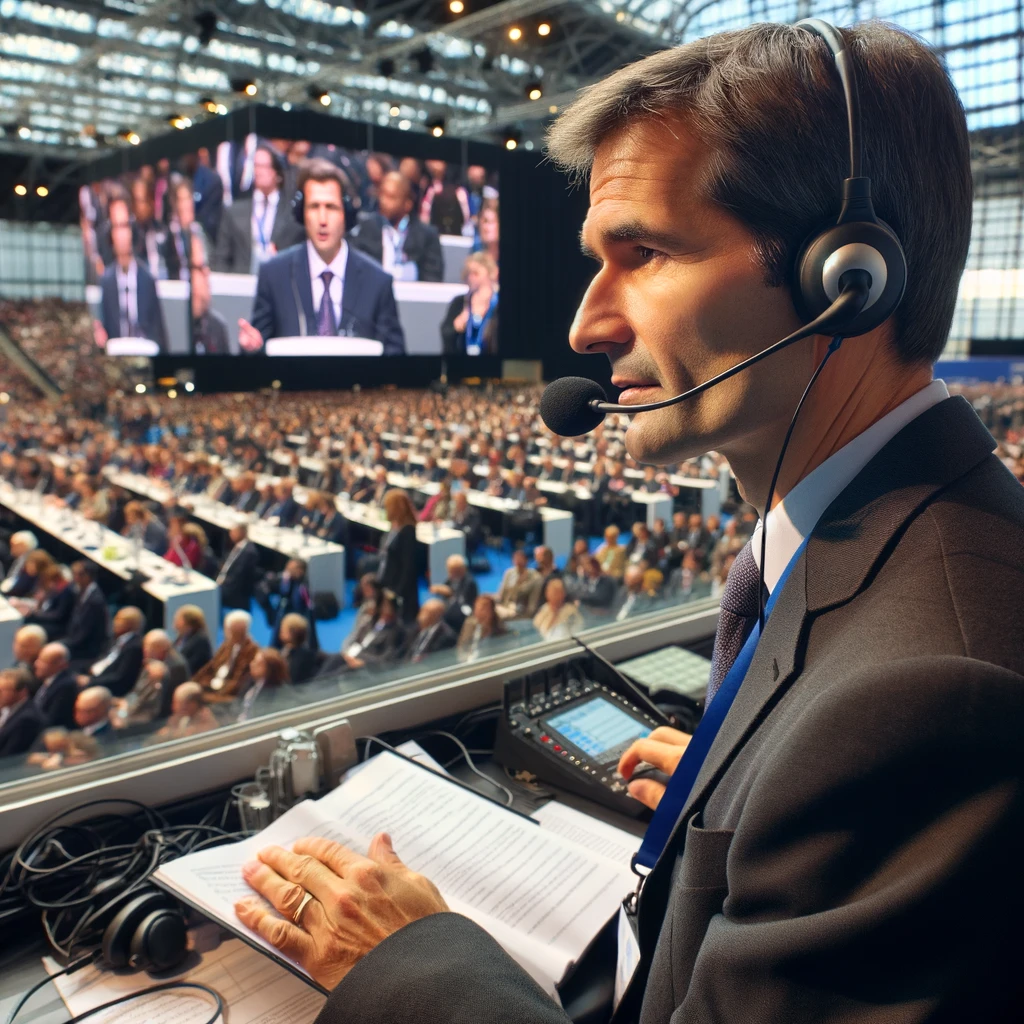Mastering Multilingual Communication: Your Ultimate Guide to Event Interpreter Services

The ability to communicate effectively in multiple languages has become a vital aspect of today's business and social gatherings.
From international conferences to cultural events, the need for clear and accurate language interpretation is more critical than ever.
This comprehensive guide will delve into the world of event interpreters, shedding light on their important role and helping you harness the power of multilingual communication to elevate your events.
What is an Event Interpreter?
An event interpreter is a skilled professional who facilitates communication between speakers of different languages.
They play an essential role in various settings, offering services like simultaneous interpretation, where interpretation occurs in real-time, or consecutive interpretation, which involves interpreting after the speaker has finished a segment.

Here's how they contribute to the success of your event:
- Accurate Communication: Event interpreters ensure that speakers' messages are accurately conveyed to the audience in real-time. This accuracy is crucial for conveying complex ideas, emotions, and information effectively.
- Engagement: A skilled event interpreter not only interprets words but also captures the tone, enthusiasm, and emotions of the speaker. This ensures that the audience remains engaged and connected.
- Inclusivity: Event interpreters make your event inclusive by breaking down language barriers. This allows attendees from different linguistic backgrounds to fully participate and benefit from the event.
- Global Reach: With the help of interpreters, your event can reach a global audience. This widens your reach and opens up opportunities for international partnerships and collaborations.
What are the Types of Event Interpreters?
Event interpreters come in various forms, each tailored to the specific needs of your event:
1. Simultaneous Interpreters
These interpreters work in soundproof booths, listening to the speaker through headphones and delivering the interpretation through microphones in real-time. This is common in large conferences and international summits.
2. Consecutive Interpreters
Consecutive interpreters translate after the speaker has finished speaking, often taking notes during the speech. This style is suitable for smaller events, workshops, and one-on-one conversations.
3. Whisper Interpreters
Also known as "chuchotage," whisper interpreters provide real-time interpretation to a small group or an individual. This is an excellent choice for events where only a few participants require translation.
4. Sign Language Interpreters
For events catering to the deaf and hard of hearing community, sign language interpreters ensure that everyone can access the content. They convey spoken language into sign language and vice versa.
In-Person vs. Remote Interpretation Services
The choice between in-person and remote interpretation depends on the nature of the event.
In-person interpreters offer a more personal touch, ideal for smaller, intimate settings.
Remote interpretation, facilitated through technology, is better suited for larger or virtual events. Both have their unique technical requirements and benefits.

Event interpreters are frequently requested for languages like Spanish, Mandarin, French, and Arabic. Cultural sensitivity is key in interpretation, and understanding the nuances of each language is essential for effective communication.
For further insights into the importance of event interpreters and their role in making your event accessible and engaging, you can refer to this informative guide on working with sign language interpreters.
How to Choose the Right Event Interpreter
Selecting the right event interpreter is crucial to the success of your event. Here are some factors to consider:
- Language Proficiency: Ensure that the interpreter is proficient in the languages spoken at your event. They should be native or near-native speakers of both languages.
- Subject Matter Expertise: If your event involves technical or specialized content, look for interpreters with expertise in that field. They'll be better equipped to handle industry-specific terminology.
- Experience: Experienced interpreters are more likely to handle unexpected situations with grace and professionalism. Check their track record and ask for references.
- Equipment: Depending on the type of interpretation required, ensure that the interpreter has access to the necessary equipment, such as booths, headphones, or microphones.
- Cultural Sensitivity: Interpreters should not only be proficient in language but also culturally sensitive. They should understand the cultural nuances that may impact communication.
Modern technology, including AI tools and interpretation apps, has revolutionized event interpretation. These tools offer flexibility and scalability, making real-time interpretation more accessible and efficient.
Effective collaboration with event interpreters requires clear communication and preparation. Provide them with materials in advance and ensure they have a clear understanding of the event's context and objectives.
The Event Interpreter Process
Now that you understand the importance of event interpreters and how to choose the right one, let's walk through the typical process of working with them:
- Assessment: Begin by assessing your event's language needs. Determine which languages will be spoken and the scope of interpretation required.
- Booking: Reach out to experienced event interpreters well in advance of your event date. Quality interpreters tend to have busy schedules, so booking early is essential.
- Preparation: Provide interpreters with any relevant materials or speeches in advance. This allows them to familiarize themselves with the content and prepare for accurate interpretation.
- Logistics: Ensure that the event venue is equipped with the necessary interpretation equipment, such as booths, headphones, or microphones.
- Coordination: On the day of the event, coordinate with the interpreters to ensure they are in the right place at the right time. Communication is key to a successful interpretation process.
The Impact of Event Interpreters on Your Event's Success
When you invest in event interpreters, you're not just ensuring that language barriers are overcome; you're also enhancing the overall experience and success of your event.
Here's how:
- Professionalism: Event interpreters add a level of professionalism to your event, showing your commitment to inclusivity and effective communication.
- Global Reputation: Hosting events with quality interpretation can enhance your organization's global reputation and attract international attendees and partners.
- Audience Satisfaction: Attendees who can fully understand and engage with your event are more likely to leave satisfied and enthusiastic, leading to positive feedback and future attendance.
- Networking Opportunities: Effective communication facilitated by interpreters can lead to valuable networking opportunities and partnerships with individuals from diverse backgrounds.
- Legal Compliance: In some cases, providing interpretation services may be legally required, especially if your event is government-related or involves public services.
Conclusion
In a world that thrives on diversity and global interaction, event interpreters are indispensable. They transform language barriers into opportunities for connection and understanding, ensuring that your event is accessible and engaging for all.
So, whether you're planning a multinational conference, a multicultural festival, or a business summit, remember that event interpreters are the key to unlocking the potential of your event and making it an unforgettable experience for everyone involved.
Contact us to find out how we can help make your next event a success.
